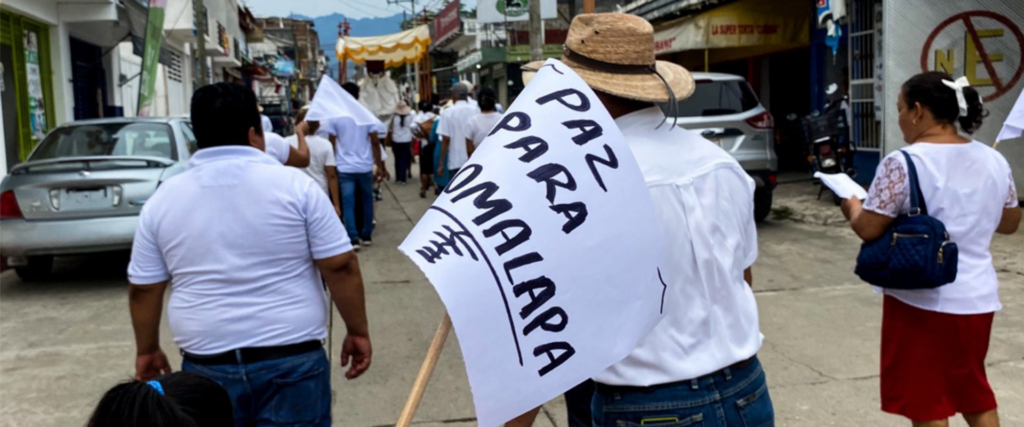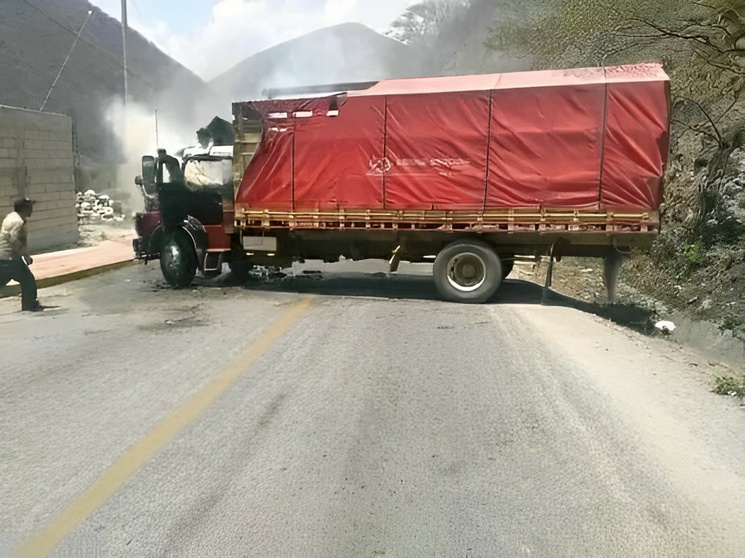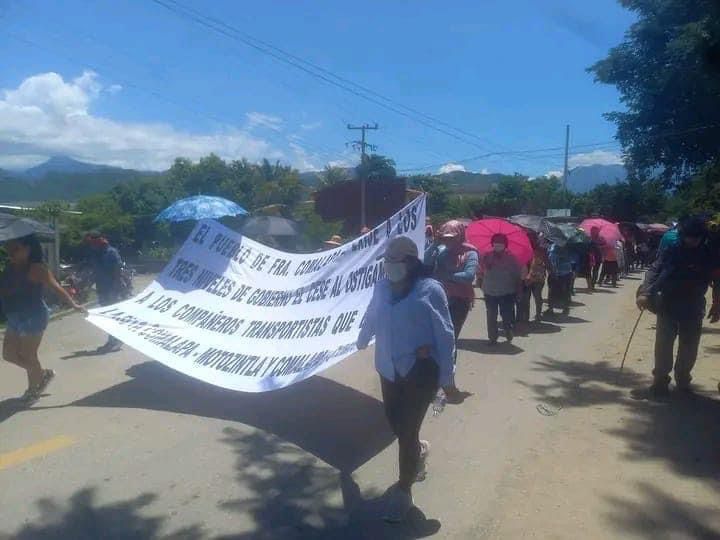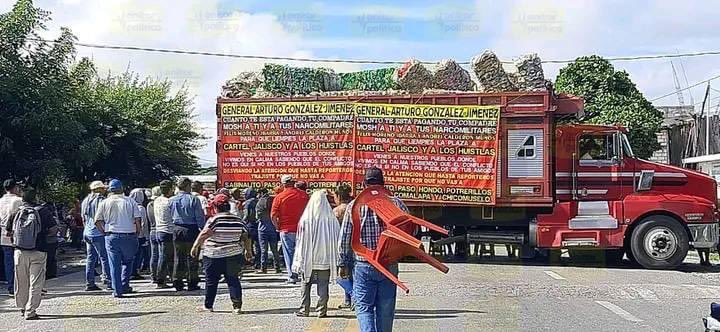
Sara Frabes
The Sierra Madre region and the southern border between Chiapas and Guatemala is on fire. The negligence of the authorities increases the risk for the population in the face of constant armed confrontations, disappearances, forced recruitment and displacements, Chiapas and national social organizations charge.
Extortion, threats and kidnappings are part of daily life. Also the co-optation and forced integration of social, peasant, merchant and transportation organizations to participate in criminal activities; in addition to the disappearance of community leaders and authorities.
In addition to the above, there is the negative impact on the economy after almost two weeks of road blockades that prevent the movement of goods and basic foodstuffs, which have already reached stratospheric prices due to shortages. In addition, education officials announced the suspension of classes as of this week, as a measure to preserve the safety of teachers and students in the face of the violence plaguing the region.
“Given the panic and uncertainty created in society, we decided to temporarily suspend work activities in all schools in the school zone so as not to expose students, teachers, teaching staff and parents,” said the official statement from the school authorities.
You may be interested in – Organized crime takes control of mining territory in Chiapas

In light of this situation, organizations such as the Guatemala-Mexico Migration and Gender Cross-Border Coordination Group (MTMG), the Southern Border Monitoring Collective and the Network for the Rights of Children in Mexico (REDIM), through the National Network of Civil Human Rights Organizations “All Rights for All” (Red TDT), released a statement to warn that, more than three months after the armed confrontation between organized crime groups in the community of Nueva Independencia, also known as Lajerío, and neighboring communities in the municipality of Frontera Comalapa, “there is still no comprehensive plan of attention from the Mexican State to guarantee the life and security of the civilian population of this and other communities in the region.”
The violence broke out causing the forced displacement of approximately 3,500 people. For almost four days there was no state presence or intervention. It was not until May 30 that approximately 1,500 elements of the National Guard (GN) and the Army arrived on the scene.
“To date, not a single person has been detained; their presence (military and GN) has not meant that the organized crime groups have stopped their illicit activities either, as extortion and threats continue,” the social organizations maintain.
According to a leaked document from the Secretariat of National Defense (Sedena), dated June 2022, the Sinaloa cartel maintains hegemony in Chiapas, but since the murder of Ramón Gilberto Rivera Beltrán, El Junior, happened in July 2021, it “caused a vacuum in the leadership in the criminal group he headed (Sinaloa cartel), causing struggles and differences between the cells that comprise it, considering a fracture within the cartel structure.”
According to the complaint, following the war in May, violence spread to communities and ejidos in municipalities adjacent to Frontera Comalapa, such as Chicomuselo and La Trinitaria, “where organized crime offers projects and protection in order to continue growing its territorial control. It is also clear that far from resolving conflicts and establishing a basis for peace, the conditions for the growth and expansion of these criminal groups continue to be permitted.
It is worth noting that during the last few weeks there have been blockades, checkpoints, assaults and confrontations between organized crime groups in the municipalities of Chicomuselo, Siltepec, Frontera Comalapa, Amatenango de la Frontera, Mazapa de Madero, Motozintla, Bella Vista, La Concordia, Villacorzo and El Parral; in addition to an increase in the presence of armed individuals in the region. “All of this does nothing more than maintain in force the aggravation of the violence in the region, as well as the responsibility of the Federal and Chiapas governments in their failure to present lasting solutions to the problems, they accuse in a communiqué.
The organizations emphasize that the closure of businesses, schools, as well as the lack of health and transportation services, implies damage to the resources and livelihoods of families in the region.
This places their food security at greater risk, in addition to negatively impacting the physical and mental health of the people who live in fear of further aggressions.
National media have reported that the cost of basic foodstuffs has skyrocketed, tortilla shops are out of business and fuel is scarce. In municipalities of the border region and highlands, blockades on the Panamerican highway have been increasing for the last 10 days. There has also been an increase in murders and kidnappings, so businesses have closed their doors and the population is sheltering in their homes.
Local testimonies indicate that the blockades near the crossroads of Chamic and the highway that crosses the highlands, near the municipality of Motozintla, keep the municipality of Frontera Comalapa permanently cut off, and also affect the municipalities of Mazapa de Madero and Amatenango de la Frontera. The region is home to approximately 130,000 people.

Thousands marched in Frontera Comalapa to demand the removal of the roadblocks that keep the municipality isolated.
This Monday (18), around 8 thousand people marched in Frontera Comalapa to demand the withdrawal of the road blockades, which they claim are being carried out by members of the Sinaloa cartel. Local media reported that the demonstration was promoted by the El Maíz group, which is linked to the Jalisco Cartel – New Generation (CJNG). According to testimonies of the population, they were forced to participate in the protest.
Negligence of the authorities
Human rights organizations maintain that the region is experiencing a total subjugation and silencing of the population, and point out that this is happening in the context of the complicity of the municipal authorities, who lack the trust of the population to attend to complaints and provide support for the inhabitants.
In addition to the above, there is a lack of confidence in the role of the army elements that arrived in the region in May. “The population warns of possible confrontations; in addition, there are reports that several of the displaced families were pressured to return to their homes, even when there were no safe conditions for their return. This high degree of uncertainty generates fear, concern and insecurity, which implies a constant re-victimization of the population,” they accuse.

In the municipality of Chicomuselo, through assembly agreements, it was requested that the presence of the security forces and armed forces respect the human rights of the population, fearing that they would carry out abuses against the inhabitants, as is reported in other parts of the country.
“There is systematic violence that continues to escalate under the impunity with which organized crime in the region operates, with the acquiescence of the municipal, state and federal governments. The abandonment and repeated failure of the State at all levels to guarantee the integrity and security of the population of the region and the minimization of the situation by the Federal administration, place the civilian population, journalists and human rights defenders in a situation of greater risk and vulnerability,” the organizations state.
Since September 9, the Sedena announced the incorporation of 500 soldiers, belonging to the 39th military zone, for the installation of control points between the municipalities of La Trinitaria, Frontera Comalapa, Chicomuselo, Mazapa de Madero and Motozintla. However, far from the violence ceasing, there has been an increase in aggressions by organized crime.
Original text published in Avispa Midia on September 19th. https://avispa.org/desborde-de-violencia-en-frontera-sur-de-chiapas-expone-poblacion-a-escasez-e-inseguridad/
Translation by Schools for Chiapas
